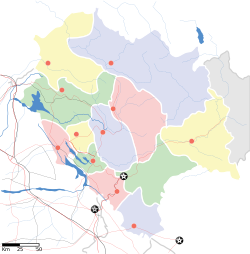Malana, Himachal Pradesh
| Malana | |
|---|---|
| village | |
 |
|
| Location in Himachal Pradesh, India | |
| Coordinates: 32°03′45″N 77°15′37″E / 32.0626008°N 77.2603548°ECoordinates: 32°03′45″N 77°15′37″E / 32.0626008°N 77.2603548°E | |
| Country |
|
| State | Himachal Pradesh |
| Population (July 2017) | |
| • Total | 4,700 |
| Languages | |
| • Official | Hindi |
| Time zone | IST (UTC+5:30) |
Malana is an ancient Indian village in the state of Himachal Pradesh. This solitary village in the Malana Nala, a side valley of the Parvati Valley to the north-east of Kullu Valley, is isolated from the rest of the world. The peaks of Chanderkhani and Deotibba shadow the village. It is situated on a remote plateau by the side of the torrential Malana river, at a height of 2,652 metres (8,701 ft) above sea level. Malana has its own lifestyle and social structure and people are strict in following their customs. Malana has been the subject of various documentaries, including Malana: Globalization of a Himalayan Village, and Malana, A Lost Identity. The existing speakers of the autochthonous language Kanashi, the traditional language of the inhabitants of Malana, number approximately 1700. According to the 1961 census, the language speakers were then 563, but today the population of Malana is at least three times as large as 40 years ago.
According to the local legends, Jamlu rishi (sage) inhabited this place and made rules and regulations. The locals claim it to be one of the oldest democracies of the world with a well-organized parliamentary system, guided by their devta (deity) Jamlu rishi. Although Jamlu is currently identified with a sage from the Puranas, this is a relatively recent development. Jamlu is believed to have been worshipped in pre-Aryan times. Penelope Chetwood recounts a tale about an orthodox Brahmin priest, who visited Malana, and tried to educate the locals about the pedigree of their god, and what subsequently befell the hapless priest.
A dam project, the Malana Hydro Power Station, has brought Malana much closer to the rest of the world and provides revenue for the region. A new road has shortened the walking time from several days to just 4 hours. The Hydro Malana Project has also ruined the beauty of the valley. In 2004, Malana was adopted by Aryan Sharma, a businessman based in Delhi. On 5 January 2008, a raging fire in the village, which burnt for more than 5 hours, destroyed cultural structures and parts of ancient temples located in the village. In 2017, the village ordered the closure of approximately a dozen guest houses and restaurants, ostensibly on the orders of the deity Jamlu.
...
Wikipedia


